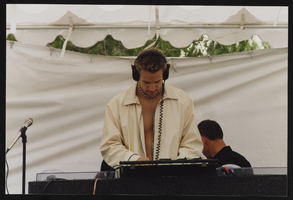Search the Special Collections and Archives Portal
Search Results
Rodel Fuentes oral history interview
Identifier
Abstract
Oral history interview with Rodel Fuentes conducted by Tracy Fuentes on December 4, 2021 for Reflections: The Las Vegas Asian American and Pacific Islander Oral History Project.
Rodel Fuentes tells stories of his upbringing in Manila, Philippines, where he was raised in a shared family home amongst his parents, siblings, aunts, and uncles. He talks about his parents' immigration to the United States and how he later joined them in Los Angeles, California where he met and married his wife. Rodel Fuentes shares the couple's decision to move to Las Vegas, Nevada, his work at Dunn Edwards paint company, and how he became a licensed general contractor and real estate agent where he now owns his own company. Rodel Fuentes discusses his thoughts on Las Vegas' diversity, affordability, restaurants, and Asian community. He also talks about experiencing anti-Asian hate, worsened by misconceptions and discrimination that came from the COVID-19 pandemic.
Archival Collection
Joseph Ostunio oral history interview
Identifier
Abstract
Oral history interview with Joseph Ostunio conducted by Claytee D. White on December 20, 2017 for the Remembering 1 October Oral History Project. In this interview, Joseph Ostunio discusses his early childhood in Las Vegas, Nevada and how he grew to love country music. He talks about the Route 91 Harvest music festival, which he attended with his friend in 2017. He describes the events of that weekend and the shooting on that Sunday, October 1, 2017, during which his friend was shot. Ostunio ends the interview with his feelings regarding Las Vegas and what he has learned about himself from this experience.
Archival Collection

Wade Maggert as the disc jockey for Club Utopia at Gay Pride, image 001: photographic print
Date
Archival Collection
Description
Image

Wade Maggert as the disc jockey for Club Utopia at Gay Pride, image 002: photographic print
Date
Archival Collection
Description
Image
Maury Soss oral history interview
Identifier
Abstract
Oral history interview with Maury Soss conducted by Nyla Petersen on February 20, 1980 for the Ralph Roske Oral History Project on Early Las Vegas. In this interview, Soss discusses his personal history and the history of Las Vegas, Nevada. Soss describes the casinos, clubs, and life in Las Vegas during the early 1930s, and running Fanny's, a dress store, with his mother. He also describes women's fashion in the 1930s and how modern styles have changed since the early twentieth century. Soss goes on to discuss the Helldorado Parade, the development of Las Vegas through its casinos and public works, and the entertainers who have performed over the years in Las Vegas. Soss then talks about the arts community in Las Vegas and the need for a greater artistic culture in the city.
Archival Collection

Olivia Meneses oral history interview: transcript
Date
Archival Collection
Description
Oral history interview with Olivia Meneses conducted by Elsa Lopez and Barbara Tabach on September 18, 2019 for the Latinx Voices of Southern Nevada Oral History Project. Olivia Meneses describes growing up in Mexico City and attending la Universidad Iberoamericana during the 1968 student movement that culminated in the Tlatelolco massacre. She discusses migrating to the United States in 1983 and moving to Las Vegas in 1985, where she began teaching Spanish to kindergarten students.
Text
Antioco Carrillo oral history interviews
Identifier
Abstract
Oral history interviews with Antioco Carrillo conducted by Rodrigo Vazquez and Monserrath Hernández on June 27, 2019 and July 11, 2019 for the Latinx Voices of Southern Nevada Oral History Project. In this interview, Carrillo discusses his early life in Jalisco, Mexico. He talks about attending an all-boys school, the braceros program, and moving to Las Vegas, Nevada in 1987. Carrillo describes the HIV/AIDS epidemic in Las Vegas, being executive director of Aid for AIDS Nevada (AFAN), and the disproportionate infection rate of Hispanics and African Americans. Carrillo talks about advocating for same sex marriage, his involvement with lawsuits that involve defining marriage in Nevada, and being the first same-sex marriage in Nevada. Lastly, Carrillo discusses the struggles to achieve equality, and living in a heterosexual society.
Archival Collection
Julia Payne oral history interviews
Identifier
Abstract
Oral history interviews with Julia Payne conducted by Claytee D. White on February 11, 2004 and March 07, 2004 for the Boyer Early Las Vegas Oral History Project. In the first interview, Payne discusses arriving to Las Vegas, Nevada in 1961. She describes discrimination, redlining on the Westside, and recalls the lack of integration at the time. Payne then discusses Jackson Street and compares it to the Las Vegas Strip. Lastly, Payne talks about Cove Hotel, Hank’s Place, Colony Club, and the decline in African American businesses on Jackson Street. In the second interview, Payne discusses welfare rights, changes to the Westside and growth of suburban areas. She describes her employment with the Southern Nevada Drug Abuse Council and becoming the first African American substance abuse counselor. Lastly, Payne discusses her position as Executive Director of Nevada Treatment Center.
Archival Collection
Mary Stafford oral history interview
Identifier
Abstract
Oral history interview with Mary Stafford conducted by Gale Robinson on March 05, 1977 for the Ralph Roske Oral History Project on Early Las Vegas. In this interview, Stafford discusses her personal history and the history of Henderson, Nevada. Stafford describes living in Henderson during the 1950s and the importance of the Basic Magnesium Plant during World War II. She then talks about how Henderson has grown and the different chemical plants that opened in the town. Stafford goes on to discuss her career working for the local newspaper,
Archival Collection
